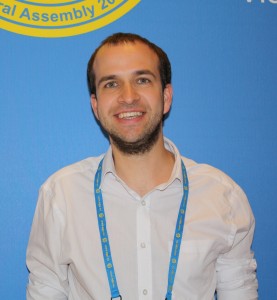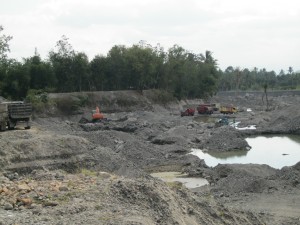 Yesterday afternoon, Joel Gill (GfGD’s National Director) gave a presentation within the ‘EOS7 – Geoethics and Geoeducation’ session at the EGU. This talk examined the value of placements in helping students to better contribute to sustainable development.
Yesterday afternoon, Joel Gill (GfGD’s National Director) gave a presentation within the ‘EOS7 – Geoethics and Geoeducation’ session at the EGU. This talk examined the value of placements in helping students to better contribute to sustainable development.
Geologists have a lot of training in the field, as our recent photo series “Geologists in the Field” highlights. This training, however, is normally limited to training in physical science rather than the social dimensions that are also required to apply our work in an effective and sustainable manner. In the example of a water project in Tanzania – this requires good geology and hydrogeology, but also effective community mobilisation, engineering, an understanding of participatory techniques and an ability to communicate across cultures and disciplines. These are skills that we may touch on in some aspects of our education and professional training – but they are rarely a focus.
This example, and many others, highlight the importance of geologists growing in their understanding of social science (e.g., issues such as vulnerability and sustainability) and an appreciation of the importance of social science techniques (e.g., participatory approaches). At Geology for Global Development we recognise the significant contribution that good geoscience can make to international development – but for this to have maximum effect, it needs to be applied in a sustainable manner. This is one reason why we are working to develop placement schemes in the UK, and supporting placements overseas. Such opportunities give students the chance to identify knowledge and skills gaps, and begin the process of developing these skills.
Through UK placements, such as that undertaken by Ellie Murtagh in 2012 and Sam Marshall/Amy Wright in 2013, students get the opportunity to explore a career in the development sector. They can ask questions about how geoscience is applied, and see for themselves the range of skills that are required. Overseas placements, such as the one Laura Westoby undertook in Indonesia (reported on in the latest IUGS-GEM newsletter) or the work David Cavell/Greg Smith did in the Solomon Islands, give students the opportunity develop cross-cultural skills and understand the complexity of real life development work. These projects facilitate knowledge exchange where the technical capacity of both students and hosts can be developed, and students can grow in their understanding of community vulnerability and sustainable development.
On a personal note, I was also lucky enough to help out with an evaluation of a water project in East Africa shortly after graduating from my first degree and before commencing my MSc in Engineering Geology. It is no understatement to say that this revolutionised my understanding of the significant potential that geology has in the fight against global poverty – and the skills that I would need to develop to apply it well.
Placement opportunities, be they in the UK or overseas, can help in the training and equipping of students to make a greater contribution to development. We are developing placements in the UK and actively seeking partners who would be willing to give such opportunities to students. We are supporting projects such as the Water Brigades project at Imperial College, through which a number of Earth Science students will be visiting Ghana. And in the future, we would like to send our own teams of students to support projects, develop skills, and help strengthen the technical capacity of local geologists. If you’d like to support us in this exciting work, through providing placements or making a donation to support students undertaking placements, then please get in contact through our website.
Joel Gill is the Founder and National Director of GfGD. He is currently undertaking a PhD, examining natural hazard interactions, at King’s College London. This work is jointly funded by the Natural Environment Research Council and the Economic and Social Research Council.

